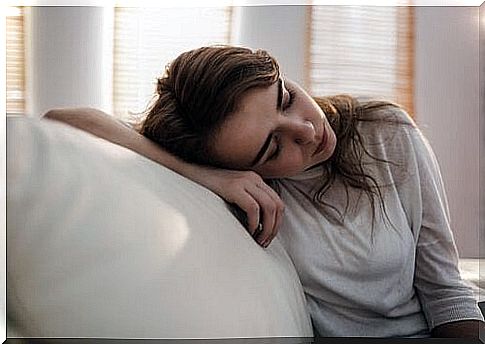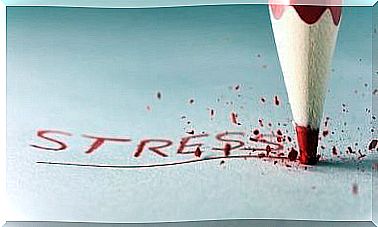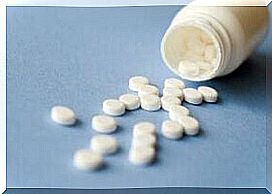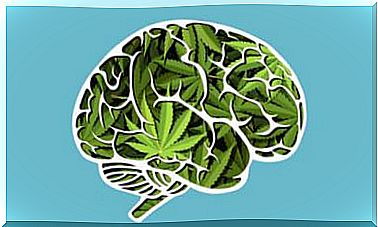The Effects Of Caffeine On Depression

A lot of people are not able to draw their curtain in the morning without their caffeine fix. In how caffeine does affect mental health ? This issue has given rise to great debate, and continues to do so. On the one hand, many believe that caffeine can help with depression. On the other hand, many believe that on the contrary, it can intensify it and make it chronic. This article deals with precisely that topic, namely the effects of caffeine on depression.
Caffeine is a substance capable of altering our mood. It is found in the world’s most popular drinks. It’s so ubiquitous that it’s easy to forget it’s a psychoactive drug. In other words, it alters brain function, the mood and behavior.
Coffee: the effects of caffeine on depression
There is a lot of literature supporting the hypothesis that caffeine is beneficial in reducing the risk of depression. For example, a major meta-analysis – with over 346,000 participants – that investigated the link between caffeine and depression found that caffeine, and more specifically coffee, was protective against depression. This analysis also revealed that coffee had a more positive effect against depression than tea, and that this would be due to the lower caffeine content of the latter.
Another meta-analysis – carried out with 330,000 participants – came to the same conclusion. Other studies have also shown that the risk of depression after ingestion of caffeine is significantly reduced when people take their daily dose.
So, if coffee seems to have more effects than tea, it is because some of its components can counteract the negative effects of depression. Coffee contains chlorogenic acid, ferulic acid and caffeic acid. These acids may reduce inflammation in nerve cells in people with depression.
Added to the natural antioxidant properties of caffeine , coffee may act as an anti-inflammatory in affected parts of the brain. This can relieve some of the discomfort and anxiety caused by depression.

Tea : the effects of caffeine on depression
Green tea, thanks to its super antioxidant properties, can act as effectively as coffee in the fight against depression. Green tea also contains folic acid (vitamin B9), polyphenols and theanine. Substances that can help cope with depression:
- It is thought that folic acid is a stimulus for positive moods
- Ferulic acids have antidepressant properties
- Theanine has been shown to increase dopamine and serotonin levels in the brain
How Does Caffeine Relieve Symptoms of Depression?
One thing is certain: caffeine is a molecule with the fascinating power to alter the chemistry of our brain. The point is, we don’t have all the answers to depression available to us. Mainstream theories support the idea that depression is caused by:
- A chemical imbalance (neurotransmitters)
- Inflammation of the brain
- Underlying health conditions
- A genetic trend
- Emotional trauma
- Stressful life circumstances

Caffeine does not affect all of the potential causes of depression. It does this in two ways that are important in fighting depression. On the other hand, caffeine increases chemicals in the brain that stimulate the state of mind. On the other hand, caffeine easily reaches the brain, where it alters the activity of two neurotransmitters of particular importance for depression, dopamine and serotonin.
Serotonin is the neurotransmitter most closely linked to depression. However, regular consumption of caffeine is proven to lower serotonin levels. Consuming caffeine regularly may not be a good long-term strategy for treating serotonin-based depression .
Caffeine also increases dopamine, which is the neurotransmitter most closely linked to motivation, focus and productivity. On the other hand, abnormal dopamine levels can also be the cause of depression.
The anti-inflammatory effect of caffeine
Another theory is opposed to the theory of chemical imbalance. She defends the idea that depression is the result of chronic inflammation of the brain. The brain has its own immune system, whose messengers, cytokines, can activate inflammation in the brain, destroy tissue and impair brain function.
The release of pro-inflammatory cytokines can contribute to depression, anxiety, memory loss, inability to concentrate, schizophrenia, bipolar disorder, and a high risk of suicide.
Coffee contains a large amount of anti-inflammatory compounds that can reduce brain inflammation associated with depression. For example, chlorogenic acid, ferulic acid, caffeic acid, nicotinic acid, trigonelline, quinolinic acid, tannic acid and finally, pyrogallol.
Possible negative effects of caffeine on depression
According to some experts, all of the effects of caffeine on depression are positive. But others believe that in fact, caffeine can make us more vulnerable, in the sense that excessive ingestion of caffeine can cause anxiety, headaches, increased blood pressure, palpitations. , nausea and worry.
Each of these symptoms is related to the body’s “fight or flight” response. If this reaction happens too often, it could cause inflammation of the brain and the onset of disease.
Several studies have also shown that there is a link between coffee consumption and the intensification of depression; for example, a study found that consuming caffeine could worsen the condition of depressed people with mood disorders. The study found a tendency for greater anxiety, especially in people with panic attacks.
Remember, caffeine only boosts the nervous system. This, in people with depression, can lead to increasingly severe relapses once the effect of caffeine has worn off.








